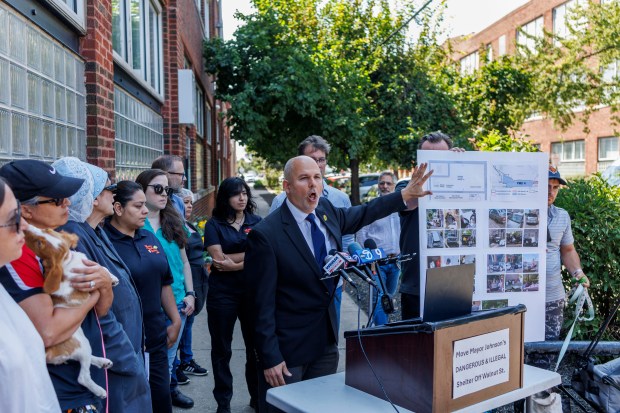A group of business owners and residents near the United Center say that they’re being negatively impacted by the hundreds of migrants who are living at a nearby shelter and are demanding that the mayor move them.
Roger Romanelli, executive director of the Fulton Market Association, told reporters at a news conference Tuesday that he believed everyone should be treated with respect and dignity under the law, but claimed that it’s “chaos and anarchy” at the shelter at 1640 W. Walnut St. He cited increased emergency calls to the shelter, fights in the street, garbage, drug usage and other concerns.
“Right now, it is chaos and it is anarchy on Walnut Street,” he said, while dozens of migrants listened.
“What’s happening? What does that mean?” they asked.
The Near West Side shelter is one of 17 buildings run by the city and state to help shelter thousands of migrants who have come from the southern border on buses since August 2022. It opened Sept. 16 last year, and currently offers temporary housing to 416 migrants — mostly families with kids. Chicago has received nearly 46,500 migrants since it first started receiving buses, and is currently housing 5,560 in its shelters.
The news conference was held several blocks from the United Center, where thousands of delegates and politicians will gather in less than a week for the Democratic National Convention. Following record numbers of crossings at the border over the fall and winter, Chicago is under pressure to uphold its reputation as a pro-immigrant city on a national stage this summer.
As Romanelli talked, he held up a poster with several cut-up photos that showed migrants gathered in groups on the sidewalk outside. Migrants began to understand he was there to complain about the shelter, and they started to yell in Spanish: “That’s xenophobic!” Chicago police officers then told them they had to move to the other side of the street.
Romanelli held up a call log that he says documents 400 calls to 911 on the block outside the shelter from January to early May, which he told reporters he received through a Freedom of Information Act request to the city’s Office of Emergency Management and Communications.
He said he wasn’t sure of the details of all the calls, but that the noise and disruptions needed to stop through collaboration and communication with city officials.
“We were given promises that there would be law and order and that people would live and work safely on Walnut Street,” he said. “Those promises have not been kept.”
Jake Setlak, who has lived on the block for 18 years, said it is illegal for migrants to live in the warehouse because of zoning laws. He’s one of the only residents on the block. Setlak said he’s faced 11 months of chaos and crime ranging from broken glass to “fights and mob action.”
“It is virtually impossible to live safely, work properly, or even walk our dogs on our own block,” he said.
Setlak said he thinks Mayor Brandon Johnson has failed both Chicagoans and asylum-seekers on Walnut Street.
Indeed, migrants living in the shelter expressed to the Tribune that they’d received little help from shelter workers over the past few months.
Tatianna Gaspare, 34, came to Chicago and the shelter on Walnut two months ago. She is originally from Ecuador and has three kids. She’s been trying to find work since she arrived but hasn’t gotten any guidance from the several shelter workers inside, she said. She can’t work legally here.
Gaspare said she’s seen tensions bubbling up between migrants and the business owners across the street
“But we generally try to stay quiet,” she said.
Joanne Buege, owner of Cake Chicago near the shelter, said she worries about children getting injured in the street, which is often full of moving cars and people. She said migrant children deserve better than having to play in the dirt by the shelter. She, like others who spoke, believes housing people in a warehouse is against the law.
“Illegal is illegal,” she said.
The owner of the company Happy Tails & Trails said she’s lost customers because of migrants loitering outside.
“(My customers are) fearful when they come down here. They’ve been approached by people on the street,” she said. “It’s just been a very scary situation for everybody.”
Romanelli played a video on his laptop of migrants fighting on the street just outside the shelter. It shows several people throwing punches at each other, while spectators talk in Spanish.
Because it is common for migrants living outside the shelter to come to sell goods and food to those living inside, Romanelli said he wasn’t sure exactly where the migrants fighting came from.
“We don’t know if they’re from the shelter or not, but it’s all unacceptable,” he said.
To determine whether Chicago’s migrants are the dangerous threat some accuse them of being, a Tribune analysis looked at crime data at that shelter and others. The analysis showed migrant arrests are, in fact, up, but they’re rarely accused of violent felonies. Those who end up committing crimes typically steal out of desperation.
At the end of the news conference, Romanelli brought up a migrant who lives in the shelter to speak about his experience. The man talked about how stressful it has been living at the migrant shelter.
“We care about you,” Romanelli told him. “We want to have a great life in Chicago.”
Several police officers watched migrants who stood on the sidewalk across the street.




